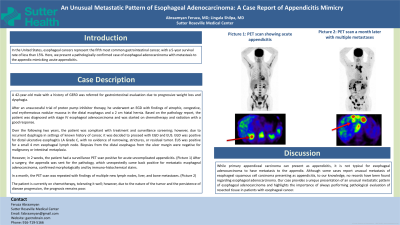Sunday Poster Session
Category: Esophagus
P0548 - Unusual Metastatic Pattern of Esophageal Adenocarcinoma: A Case Report of Appendicitis Mimicry
Sunday, October 27, 2024
3:30 PM - 7:00 PM ET
Location: Exhibit Hall E

Has Audio

Feruza Abraamyan, MD
Sutter Health
Roseville, CA
Presenting Author(s)
Feruza Abraamyan, MD, Lingala Shilpa, MD
Sutter Health, Roseville, CA
Introduction: In the United States, esophageal cancers represent the fifth most common gastrointestinal cancer, with a 5-year survival rate of less than 15%. Here, we present a pathologically confirmed case of esophageal adenocarcinoma with metastasis to the appendix mimicking acute appendicitis.
Case Description/Methods: A 42-year-old male with a history of GERD was referred for gastrointestinal evaluation due to progressive weight loss and dysphagia. After an unsuccessful trial of proton pump inhibitor therapy, he underwent an EGD with findings of atrophic, congestive, and erythematous nodular mucosa in the distal esophagus and a 2 cm hiatal hernia. Based on the pathology report, the patient was diagnosed with stage IV esophageal adenocarcinoma and was started on chemotherapy and radiation with a good response. Over the following two years, the patient was compliant with treatment and surveillance screening; however, due to recurrent dysphagia in settings of known history of cancer, it was decided to proceed with EGD and EUS. EGD was positive for distal ulcerative esophagitis LA Grade C, with no evidence of narrowing, strictures, or residual tumor. EUS was positive for a small 4 mm esophageal lymph node. Biopsies from the distal esophagus from the ulcer margin were negative for malignancy or intestinal metaplasia. However, in 2 weeks, the patient had a surveillance PET scan positive for acute uncomplicated appendicitis. After a surgery, the appendix was sent for the pathology, which unexpectedly came back positive for metastatic esophageal adenocarcinoma, confirmed morphologically and by immuno-histochemical stains. In a month, the PET scan was repeated with findings of multiple new lymph nodes, liver, and bone metastases. The patient is currently on chemotherapy, tolerating it well; however, due to the nature of the tumor and the persistence of disease progression, the prognosis remains poor.
Discussion: While primary appendiceal carcinoma can present as appendicitis, it is not typical for esophageal adenocarcinoma to have metastasis to the appendix. Although some cases report unusual metastasis of esophageal squamous cell carcinoma presenting as appendicitis, to our knowledge, no records have been found regarding esophageal adenocarcinoma. Our case uniquely presents an unusual metastatic pattern of esophageal adenocarcinoma and highlights the importance of always performing a pathological evaluation of resected tissue in patients with esophageal cancer.
Disclosures:
Feruza Abraamyan, MD, Lingala Shilpa, MD. P0548 - Unusual Metastatic Pattern of Esophageal Adenocarcinoma: A Case Report of Appendicitis Mimicry, ACG 2024 Annual Scientific Meeting Abstracts. Philadelphia, PA: American College of Gastroenterology.
Sutter Health, Roseville, CA
Introduction: In the United States, esophageal cancers represent the fifth most common gastrointestinal cancer, with a 5-year survival rate of less than 15%. Here, we present a pathologically confirmed case of esophageal adenocarcinoma with metastasis to the appendix mimicking acute appendicitis.
Case Description/Methods: A 42-year-old male with a history of GERD was referred for gastrointestinal evaluation due to progressive weight loss and dysphagia. After an unsuccessful trial of proton pump inhibitor therapy, he underwent an EGD with findings of atrophic, congestive, and erythematous nodular mucosa in the distal esophagus and a 2 cm hiatal hernia. Based on the pathology report, the patient was diagnosed with stage IV esophageal adenocarcinoma and was started on chemotherapy and radiation with a good response. Over the following two years, the patient was compliant with treatment and surveillance screening; however, due to recurrent dysphagia in settings of known history of cancer, it was decided to proceed with EGD and EUS. EGD was positive for distal ulcerative esophagitis LA Grade C, with no evidence of narrowing, strictures, or residual tumor. EUS was positive for a small 4 mm esophageal lymph node. Biopsies from the distal esophagus from the ulcer margin were negative for malignancy or intestinal metaplasia. However, in 2 weeks, the patient had a surveillance PET scan positive for acute uncomplicated appendicitis. After a surgery, the appendix was sent for the pathology, which unexpectedly came back positive for metastatic esophageal adenocarcinoma, confirmed morphologically and by immuno-histochemical stains. In a month, the PET scan was repeated with findings of multiple new lymph nodes, liver, and bone metastases. The patient is currently on chemotherapy, tolerating it well; however, due to the nature of the tumor and the persistence of disease progression, the prognosis remains poor.
Discussion: While primary appendiceal carcinoma can present as appendicitis, it is not typical for esophageal adenocarcinoma to have metastasis to the appendix. Although some cases report unusual metastasis of esophageal squamous cell carcinoma presenting as appendicitis, to our knowledge, no records have been found regarding esophageal adenocarcinoma. Our case uniquely presents an unusual metastatic pattern of esophageal adenocarcinoma and highlights the importance of always performing a pathological evaluation of resected tissue in patients with esophageal cancer.
Disclosures:
Feruza Abraamyan indicated no relevant financial relationships.
Lingala Shilpa indicated no relevant financial relationships.
Feruza Abraamyan, MD, Lingala Shilpa, MD. P0548 - Unusual Metastatic Pattern of Esophageal Adenocarcinoma: A Case Report of Appendicitis Mimicry, ACG 2024 Annual Scientific Meeting Abstracts. Philadelphia, PA: American College of Gastroenterology.
